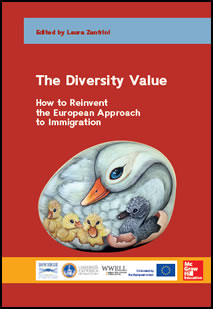The policy briefs produced through the DIVERSE project are online
The policy briefs produced through the DIVERSE project – Diversity Improvement as a Viable Enrichment Resource for Society and Economy – are now available. Diverse is an initiative co-funded by the European Fund for Integration, coordinated by the WWELL Research Centre of the Catholic University in Milan and carried out in collaboration with 14 partner organizations, among which the ISMU Foundation. The project took place in 10 European countries: Estonia, Finland, Germany, Italy, the Netherlands, Poland, Portugal, Spain, Sweden and Hungary.
The project aimed at valorizing migrations’ potential for the development of European society by acting on three strategic axes:
a) the recognition and certification of formal, non formal and informal skills, knowledges and competences of non-EU workers;
b) the reinforcement of the awareness, among enterprises and their social and institutional environment of reference, on the advantages brought by practices of Diversity Management specifically addressed to human resources with a migratory background;
c) the promotion of migrants’ participation to voluntary organizations of host society.
The policy briefs, referred to the 10 countries involved in the project, provide concrete indications for the achievement of these objectives.
The policy brief elaborated by the Italian team contains a specific focus on the Lombardy region. Based on the analysis of the most innovative experiences existing on the territory, it offers to the involved stakeholders a set of recommendations aimed at bringing to light the competences possessed by migrants, reinforcing the competitiveness of enterprises through the valorization of diversity, and promoting migrants’ civic engagement through their involvement in voluntary activities
See the italian policy brief.
On June June 11th 2015 the final report of the Diverse project was presented at the Università Cattolica
“The Diversity value. How to Reinvent the European Approach to Immigration” edited by Laura Zanfrini
The European approach to immigration is traditionally characterized by a sort of “schizophrenia”, generated by the attempt to keep together two contradictory philosophies: the “economicistic” philosophy on which the system of entry (and stay) is regulated and the philosophy of solidarity and equal opportunities.
To overcome this paradox, three major changes are necessary, which constitute the challenges addressed by the DIVERSE – Diversity Improvement as a Viable Enrichment Resource for Society and Economy – project, conducted in 10 European countries and whose results are presented in the volume: shifting from the perception of migrants as contingently instrumental resources to the conception of their human capital as a structural resource for the economic and social development of European societies; promoting a wider awareness, among different types of organizations (profit, non-profit and public), of the importance and potentialities of Diversity Management strategies; improving the social participation and the civic and voluntary engagement of Third Country Nationals in view of the construction of an inclusive European society and in order to change the common perception of immigrants as people needing to be helped and assisted.
Finally, it is only through the active involvement of different stakeholders and the implementation of different types of actions that it will be possible to achieve the ambition of “reinventing” the European approach to immigration, to overcome the European historical paradox and benefit from the “Diversity Value”.
 English
English Italiano
Italiano